We have all experienced computer freezing at one point or another. It can be quite the frustrating experience particularly if you are in the middle of your work or in an intense gaming session.
In majority of the cases, freezes happen only once in a blue moon. However, other times this could be a chronic issue and could happen as frequently as every time you turn your laptop on, which would lead you to naturally ask “why does my laptop keep freezing?”
Unfortunately as is the case with many computer related issues, there is no one specific answer to this query. You will essentially have to perform trial and error through troubleshooting to figure out where the fault lies.
In the following text I will detail some of the hallmark causes of laptop freezes.
So Why Does My Laptop Keep Freezing?
There are essentially eight highly likely causes of freezes in computers in general and laptops in particular.
1. Overheating Beyond Limit
One of the main causes of a laptop freezing is overheating. Laptops have their internal hardware in a very confined space. So if heat dissipation is compromised in any form or manner, that could lead to freezes.
The critical hardware such as CPU and GPU are designed to automatically shut the PC down once it reaches the TJMax (Thermal Junction Max) temperature. The TJMax temperature is generally 100° Celsius for CPU and GPUs.
There certainly are telltale signs that the CPU or GPU is reaching the TJMax temperature. This can manifest itself in lags and stutters due to thermal throttling and of course, freezes.
You can check the current temperature range of your CPU through simple utilities such as RealTemp.
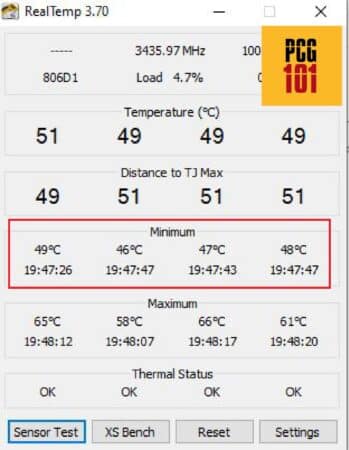
The temperature above shows the internal temperature of my laptop. At 46° Celsius min and about 61° C max, this temperature is considered quite ideal.
If your CPU is reaching TJMax, then you have an obvious issue with overheating.
There are two main causes of overheating in laptops: accumulation of dust and cooling fans malfunctioning.
Accumulation of dust essentially blocks the ventilation. This results in obvious issues with lower heat dissipation (let alone the fact that dust is also a short circuit hazard).
Cooling fans failing or thermal paste wearing off between the CPU/GPU and the cooling fan, is another cause of heating. If this is the cause, you would need expert help in either replacing the fan or the thermal paste.
2. The Dreadful Viruses
Viruses come in all shapes and colors and if you do not have a proper anti-virus software installed, the damage it wreaks on your system can be quite profound, the least of which is freezes.
Some viruses are designed to overburden your CPU beyond its limit, others are designed to literally fry it.
A quick virus scan of your PC can reveal all of the underlying pests your PC is harboring. However, in order to scan for viruses, your anti-virus software needs to have the proper signatures installed.
Therefore, you MUST ensure that your anti-virus software is ALWAYS up to date with the latest signatures updated. Newer viruses will almost go unseen by your anti-virus software IF it does not have the proper and up to date signatures.
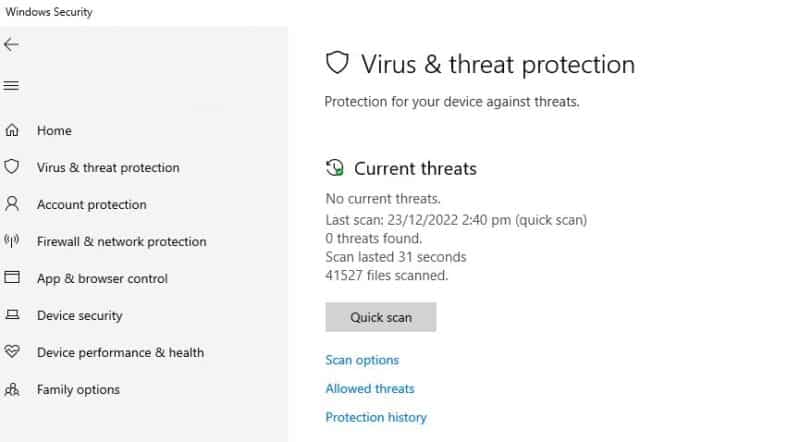
You do not need to go looking around for third-party anti-virus software since Windows already has a threat protection utility installed. You just need to keep it updated.
3. Bad Memory Issues
Memory (RAM) issues are also very common in laptops. Memory modules can go bad randomly, particularly if your laptop is old, or they can dislodge from the socket due to bumps and drops which laptops are highly prone to.
Memory issues on laptops can manifest themselves in freezes which are often followed by the Blue Screen of Death.
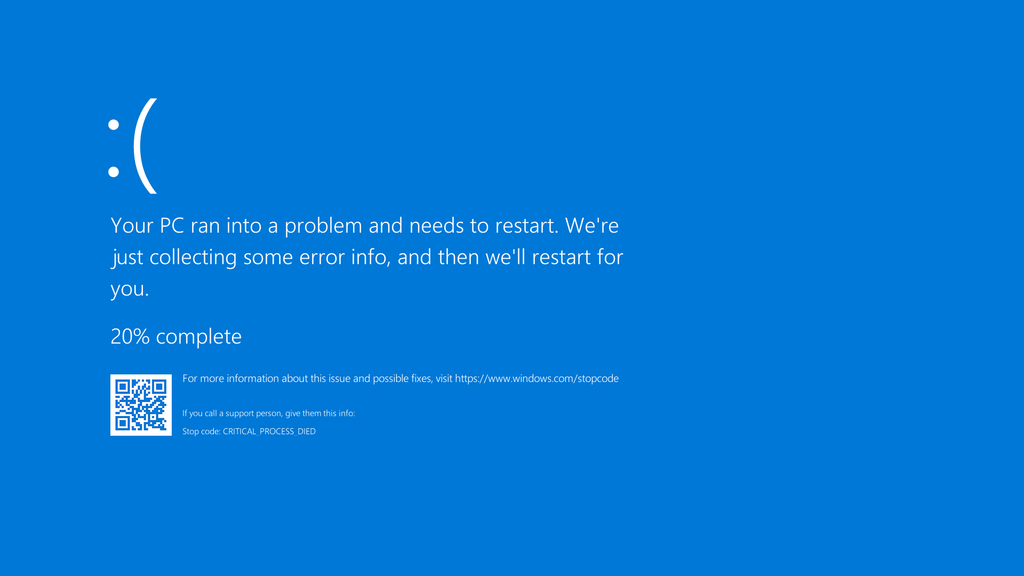
Blue Screen of DeathTo troubleshoot memory issues, you will need some technical expertise in opening up your laptop. Once you get to the memory modules, first remove them from their socket, give the sockets a good dust cleaning, replace the memory modules securely and turn your PC on.
If freezes still persist, try removing one of the modules ( if you have two) and then start your laptop.
In some cases the memory modules on laptops are soldered to the motherboard. In that case, you will need to visit a repair shop or send it back to the manufacturer.
4. A Dying Hard Drive
A dying hard drive can also cause freezes with laptops. One telltale sign that a failing hard drive is connected with laptop freezes is that your laptop would have issues booting up.
Meaning at times, when you start your laptop, it would not go past the POST screen.
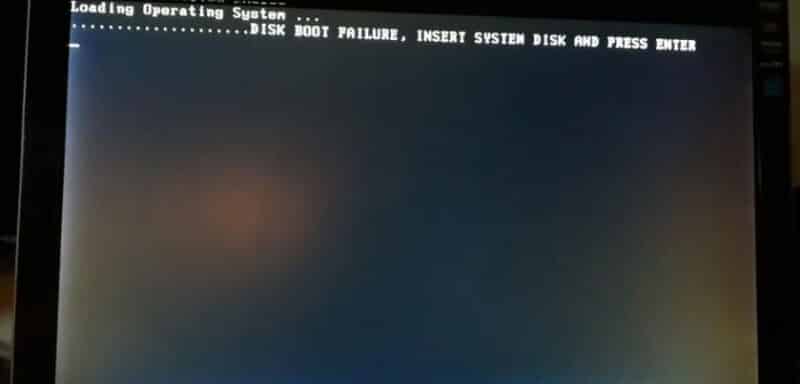
Windows has two built-in utilities that can be used to check for errors in the hard drive. These can be accessed by heading over to the hard drives Properties.
Right click on a partition and then select Properties. Once in Properties, head over to the “Tools” Tab on top. This should show you two tools for checking the hard drives integrity.
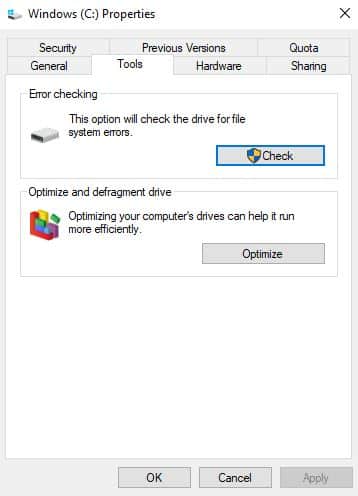
You can also use the CHKDSK command for a thorough check on any bad sectors on your hard drive.
The CHKDSK command will initiate the hard drive check the next time you restart your laptop.
5. New Driver Installation
If you have updated your Windows recently, or installed a new driver for a hardware such as the graphics card, then that could lead to malfunctions.
A dud or a bad update can cause all sorts of issues including freezes on your laptop. This can be quite easy to pinpoint. If the freezes started occurring AFTER a recent driver update then that of course points to an issue with the new driver.
To fix this issue, you can use the System Restore utility to go back to previous good settings or uninstall the new driver.
6. A Malfunctioning Peripheral
The peripheral that you plug into the USB ports on your laptop also install their relevant software onto the PC. A new mouse, keyboard etc. are all run by their software.
Sometimes these can cause software conflicts resulting in freezes. USB Flash Drives and USB external hard drives are among the most common culprits of freezes caused by peripherals, but essentially the issue could relate to any external device including printers, scanners and even USB hubs.
To remove any doubts of a malfunctioning peripheral, simply remove all of them from your laptop and then turn it on.
If the issue was caused by a malfunctioning peripheral then removing it should fix the underlying freezing issue. To figure out which peripheral was causing the issue (if you have multiple connected), you will need to re-plug each peripheral one by one until you find the culprit.
7. Broken Windows OS
Viruses, bad updates, or even accidents by yourself (deleting critical Windows files) can lead to the operating system malfunctioning and freezing.
To fix this issue, you will almost always need to perform a fresh install of the Windows on your laptop.
If there are any or all software related issues causing freezes, a fresh Windows should fix almost all of them.
8. Internal Hardware Issues
If none of the aforementioned causes was the culprit behind your laptop freezing then unfortunately you are now left with the most regretful cause: internal hardware issues.
Internal hardware issues could relate to CPU, motherboard, built-in graphics card etc. getting damaged. None of these can be fixed by yourself and you will almost always have to contact the customer support of your laptop’s manufacturer or visit a repair shop.
Internal hardware issues can generally occur due to accidental drops, shocks, short circuits etc. but they can also happen randomly and out of the blue.
Final Words
Random laptop freezes are common, however, if they happen regularly then that points to a serious underlying issue which could relate to both software and hardware.
As a rule of thumb, always start with the obvious and easiest troubleshooting steps such as checking for overheating, viruses etc. before jumping to a more serious conclusion such as a damaged internal hardware.
